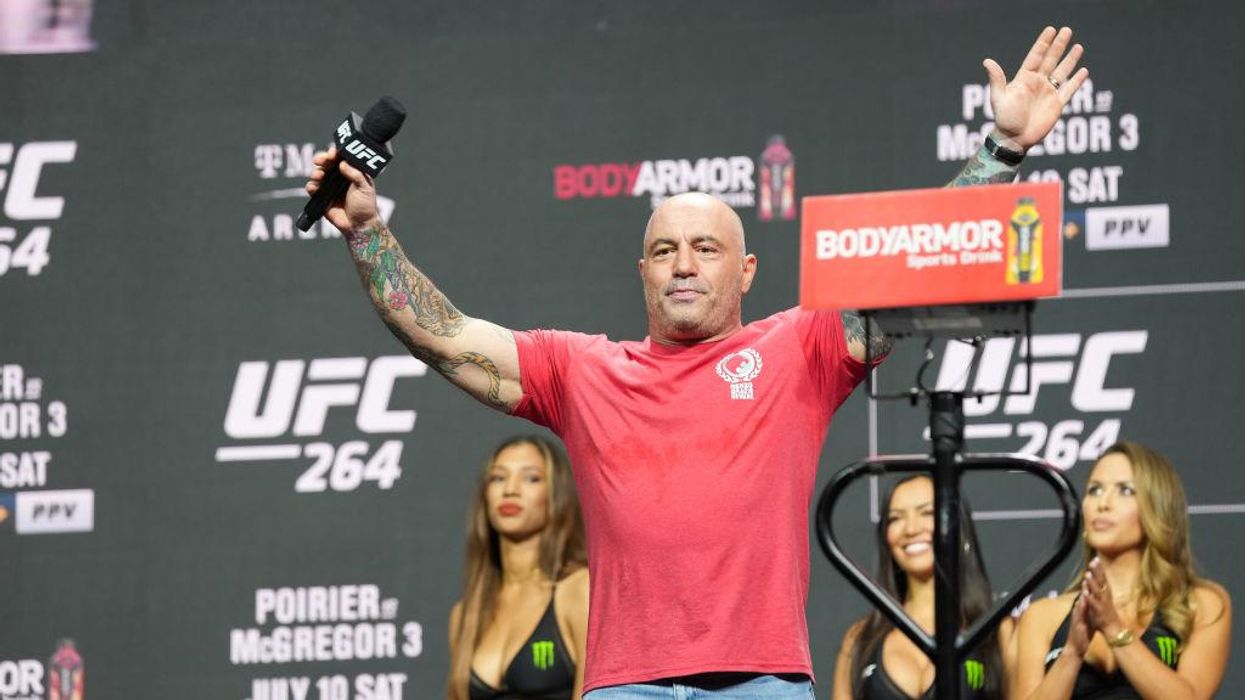
Louis Grasse/PxImages/Icon Sportswire via Getty Images

Spotify CEO Daniel Ek addressed the situation surrounding Joe Rogan in the company's post-earnings call on Wednesday. The head of Spotify said the streaming music giant is "trying to balance creative expression with the safety of our users."
"Obviously, it’s been a few notable days here at Spotify," Ek said, according to Variety.
"There’s still work to be done, but I’m pleased that Spotify is already implementing several first-of-its-kind measures to help combat misinformation and provide greater transparency," he stated. "We believe we have a critical role to play in supporting creator expression while balancing it with the safety of our users, and we will continue to partner with experts."
When asked about the effect of the Joe Rogan blowback on the company, Ek responded, "It’s too early to know what the impact will be."
"Usually when we’ve had controversies in the past, those are measured in months, not days," Ek said after the quarterly earnings call.
"I know this issue has been top of mind this week, but I think it’s important to take a step back," he said during the Q&A session. "We’re trying to balance creator expression with the safety of our users."
"So I think the important part here is that we don’t change our policies based on one creator, nor do we change it based on any media cycle or call from anyone else," the Spotify CEO continued. "Our policies have been carefully written with the input from numbers of internal and external experts in this space. And I do believe they’re right for our platform."
"And while Joe [Rogan] has a massive audience, and is actually the No. 1 podcast in more than 90 markets, he also has to abide by those policies," Ek added. "So I think when you think about that and you think about the ad business, I have a tremendous amount of confidence."
During a livestreamed company town hall on Wednesday, Ek reportedly explained why Spotify doesn't edit episodes of Rogan's show. He allegedly told employees that Spotify believes it is a distributor of Rogan's top-rated podcast, not a publisher.
“Spotify doesn’t approve Rogan’s guest list, they don’t look at his content until it goes up, and so they don’t have editing power," an anonymous Spotify employee told the Los Angeles Times. "They just look at it after it’s already on the platform and remove it if it doesn’t meet guidelines."
The unnamed source said Ek and chief content and advertising business officer Dawn Ostroff "repeatedly used the phrase 'if we were a publisher,' very strongly implying we are not a publisher, so we don’t have editorial responsibility” for "The Joe Rogan Experience."
In May 2020, Rogan reportedly signed a $100 million deal with Spotify that gave the streaming service exclusive distribution rights to his podcast, but not ownership.
Musicians have removed their music from Spotify because they are boycotting "The Joe Rogan Experience" podcast — including Neil Young, David Crosby, Stephen Stills, Graham Nash, Joni Mitchell, India Arie, and Nils Lofgren.
Financial Times reported, "Spotify and Young’s camp have been in talks over how to resolve the disagreement, according to people briefed on the negotiations. Before considering a return to the streaming service, Young wants more concrete details about Spotify’s promise to add 'content advisory' notices to any podcasts discussing coronavirus, the people said."
An anonymous senior label executive told the Financial Times, "We can’t get into a situation where any time an artist has a problem with a service, we take down their music."
Spotify Technology S.A. announced that the company had 406 million total monthly active users for the streaming service in the fourth quarter, which grew by 25 million from the previous quarter, and an 18% increase year over year. There was also a 16% increase in premium users year over year.
Barron's noted, "Spotify is still posting losses — it has lost money on a per-share basis in most quarters since it went public — but the latest loss was narrower than analysts had expected."
"Without new premium subscribers, Spotify will increasingly be dependent on advertising for its revenue, and its business model could look more like a radio station than a fast-growing subscription business. Ads, supported by products like podcasts, now make up 15% of revenue, more than ever before," Barron's added. "Being dependent on advertising and high-profile talent also presents other risks, as the company discovered over the past week."
As of Thursday morning, Spotify's stock was down approximately 14% and was hovering around $165.
Ek issued a statement on Sunday regarding the firestorm around the prolific podcaster, who has an estimated 11 million listeners each episode.
"It is important to me that we don’t take on the position of being content censor while also making sure that there are rules in place and consequences for those who violate them," Ek said.
"Based on the feedback over the last several weeks, it’s become clear to me that we have an obligation to do more to provide balance and access to widely-accepted information from the medical and scientific communities guiding us through this unprecedented time," Ek explained. "These issues are incredibly complex. We’ve heard you – especially those from the medical and scientific communities."
Ek said Spotify will "add a content advisory to any podcast episode that includes a discussion about COVID-19."
Also on Sunday, Spotify unveiled sweeping new rules regarding "dangerous content" on the streaming service. Spotify – the world's biggest streaming music service – threatened to terminate artists or podcasts that repeatedly promote "dangerous false or dangerous deceptive medical information that may cause offline harm or poses a direct threat to public health."